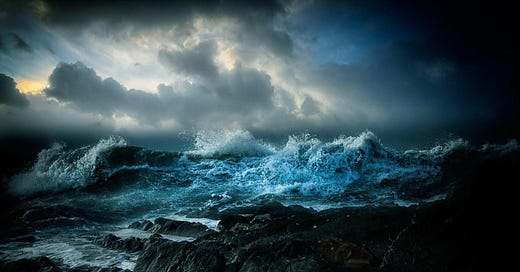It’s sudden. Always.
So sudden that it’s hard to tell if there could have been a moment to resist, to control of which direction to take. But there is no control over this hand that reaches into the safety of slumber and hauls me into the tumultuous storm of the nocturnal mind. There are demons to slay. There is no hiding.
The battle is never confined to the mind. It’s physical. Always. For as long as I can remember, I’ve had access to an interoceptive awareness that I didn’t have the language to describe. A kinesthetic kaleidoscope of experience. Conscious of external inputs, but experiencing living through an internal ocean of sensory outputs. Interoception: the availability of internal sensations to conscious awareness, a blessing and a curse.
I’ve only ever drawn twice in my life. The first was for an art exam in the Junior Cert, the Irish equivalent of the GCSEs. I hated art. But I had to do it for those exams. It required a portfolio to be put together for the year, and an exam to sit at the end. I hated the subject. So I refused to participate. Didn’t cause trouble or anything, just made it clear that the rules which made the class compulsory were clearly flawed, and I would not be contributing. “But you’ll fail.” The obvious. “Yes Miss, I’m aware of this.” I got in F in ordinary level art. “Are you not even going to try?” The pathetic entreaty to effort. “Miss, I’m not going to try in English either and I’ll get an A.”
How ironic that years later, words would fail me, and I would have to draw my way into articulating an interoceptive experience.
It’s always sudden. A jolt. Instant. Violent. Ripped from the blissful oblivion of sleep. Welcome to the storm, navigate it in the dark. Never check the clock. Time doesn’t matter here. 10 minutes. One hour. Three hours. It’s all the same. All of the paltry advice and ‘hacks’ you are told of stand like a plywood fence in a tornado. They have no power here. Like the iceberg-crushed hull of the Titanic, the torrent of thoughts rages through the gap, the sublime force of nature overwhelming any attempts to shore up the defences in time. We will go down on this ship, again, tonight.
“Sit on the floor. Draw it.” I did not expect this from the counsellor. And it was 20 years since I’d drawn anything. “Sit on the floor.” Checkmate. What a move. Bold, brilliant. Sitting upright on her couch was my comfort zone, the vantage point from which I could over-intellectualise everything. Rationalise the responses. Dare her to throw fastballs at me, aim them square at my face. Now, 34 years of age and totally infantalised, sitting on the floor with an A5 sheet and stack of crayons laid out, I had a simple task: “Draw it.”
“It.” Interoception. It wasn’t that I couldn’t feel what I was trying to describe. It could feel every sinew. It was that, for the first time in my life, my default sense-making apparatus of language had failed me. And the irony was that a crayon and a sheet of paper would provide the window to this emotional experience. As soon as crayon was put to paper, there it was. I saw it, knew it. Words failed, see sketch. The generic ‘human’ outline that you would see on an airport bathroom would have to suffice for me. The dark red ball in the abdomen. A ball of heat energy, smouldering, desperate for the relief of cool air, the breath. The dark black band wrapped over the diaphragm, repelling any relief attempt to extinguish the growing molten fireball with oxygen. Like a constrictor, every attempt to break through with a deep inhale is met with a tightening of the band. Resistance is futile.
Interoception, the blessing and curse. The blessing to inhabit the body. The curse to feel everything. The drawing was to put words on this interoceptive experience. What it looked like. What colour was it. Shape. Form. Were I to draw it again, now, I would include some more detail; the safety of the breaking day. The serene, solemn humility of early morning. Extending a comforting blanket around a shipwrecked soul, washed up from another battering on the nocturnal rocks. I drag myself to the cushion. As I have done almost every morning for a decade. “Practice with eyes closed, focus on the breath”, they say. No. Not now. Eyes open, drinking in the morning sky, honouring its light, its colour, its presence, its comfort. "You’ve made it through, again, Friend”, it says. And not the breath. The fickle breath that failed again in the storm of the night before, powerless against the tidal torrent of thought. The bodyscape is always the locus, the interiority of sensation.
It’s always sudden. The arousal from slumber and intense physiological response. But the morning comes. Quiet. Dignified. Calm. As if, in the brief period of collapsing back to sleep from the sheer fatigue of fighting the storm, the tempestuous ocean has been flattened into a sheet of quelled serenity stretching to the horizon. The confines of the storm supplanted by the vast openness of the dawning day. The morning picks up the shredded pieces of me lying around the room and tenderly puts them back together. Sitting on the cushion, I draw down the mind into the body and know that its back together. Whole again.
The storm seems distant. And they always pass. But such empty retrospective rhetoric counts for little when in the eye of it. Just make it to morning.




